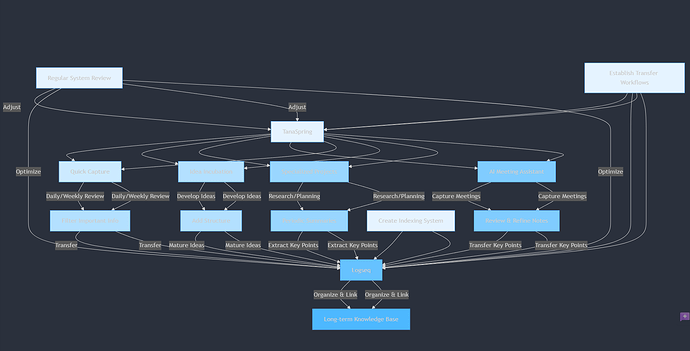I hope I spare you some struggling periods. I’ve been (and I am) a Logseq user before Tana alpha was launched 2 years ago. I am also a Tana Navigator and I am aware about the current state of the art within its development. The Logseq import was an initial easy/basic way to have your Logseq data inside Tana, but that feature has not been developed further after its initial release.
After 2 years of Tana deep diving, my journey brought me back to Logseq again, not as a replacement but as a way to expand and make my processes more honest.
I wrote this article this summer The Data Accessibility Shift: Comparing Local-First and Offline-First Approaches | by David Delgado Vendrell | Medium , and that’s what makes me re-activate the Logseq pillar within my Information and Knowledge managements.
This is my current use case between Logseq and Tana:
Quick Capture
- Tana’s mobile capture tool can be invaluable for capturing fleeting thoughts, ideas, or observations when you’re on the go. Use it to jot down anything that comes to mind, without worrying about organization or structure. Set a regular schedule (e.g., daily or weekly) to review these captures. During this review, decide which items are worth transferring to Logseq. This process acts as a filter, ensuring only meaningful information makes it into your long-term PKM.
Incubation Space
- Think of Tana as a greenhouse for your ideas. Use it to nurture concepts that aren’t yet fully formed. This could include rough outlines for articles, initial thoughts on projects, or connections you’re starting to see but haven’t fully explored. As these ideas develop, you can use Tana’s features to add structure or connect related thoughts. Once an idea has “matured” - meaning it’s clear, developed, and ready for long-term storage or action - transfer it to Logseq. This approach keeps your main PKM system (Logseq) clean and focused, while still giving you a space to play with nascent ideas.
Specialized Projects
- For projects that particularly benefit from Tana’s unique features (like its structured data capabilities or specific views), use Tana as a temporary project management tool. This could be for research projects, complex planning, or any short-term initiative that requires a lot of interconnected data. As you work in Tana, keep in mind that the end goal is to summarize and transfer key information to Logseq. This might involve creating periodic summaries, extracting main points, or creating a final project overview to add to your Logseq knowledge base.
AI Meeting Assistant
- If you find Tana’s AI meeting assistant particularly useful, consider making it your go-to tool for meeting notes. Use it during or immediately after meetings to capture discussions, decisions, and action items. After the meeting, review the AI-generated notes, make any necessary corrections or additions, and then transfer the key points to Logseq. This could involve creating meeting summary pages in Logseq, adding action items to your task management system, or linking important information to relevant existing notes.
Strategy Overview
- The overarching strategy here is to leverage Tana’s strengths for specific, often short-term or dynamic uses, while maintaining Logseq as your primary, long-term knowledge repository. This approach allows you to benefit from Tana’s unique features without risking data fragmentation or lock-in.
Implementation Tips
- To make this system work smoothly:
-
- Establish clear workflows for transferring information from Tana to Logseq.
-
- Set regular review periods for your Tana workspaces to ensure information doesn’t get lost or forgotten.
-
- In Logseq, create an indexing system or tag that indicates which notes originated from Tana, allowing you to track the flow of information between systems.
-
- Regularly reassess this hybrid approach to ensure it continues to meet your needs and adjust as necessary.
-
- Remember, the goal is to create a system that enhances your productivity and knowledge management, not one that adds unnecessary complexity. Be willing to adapt this approach based on your evolving needs and experiences.
